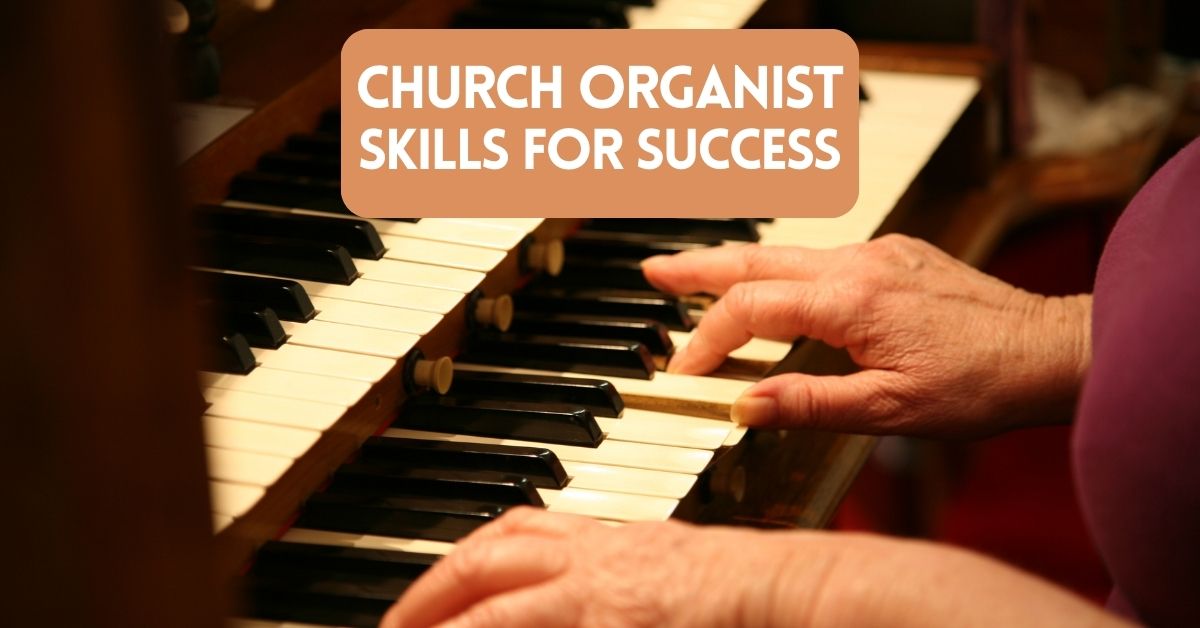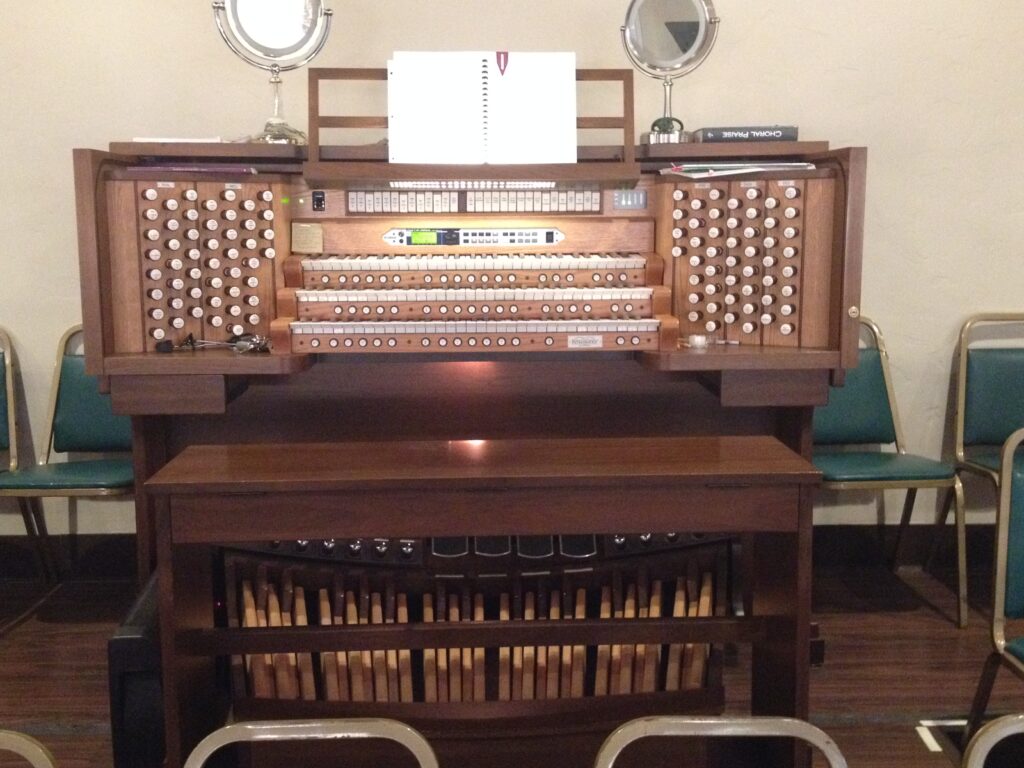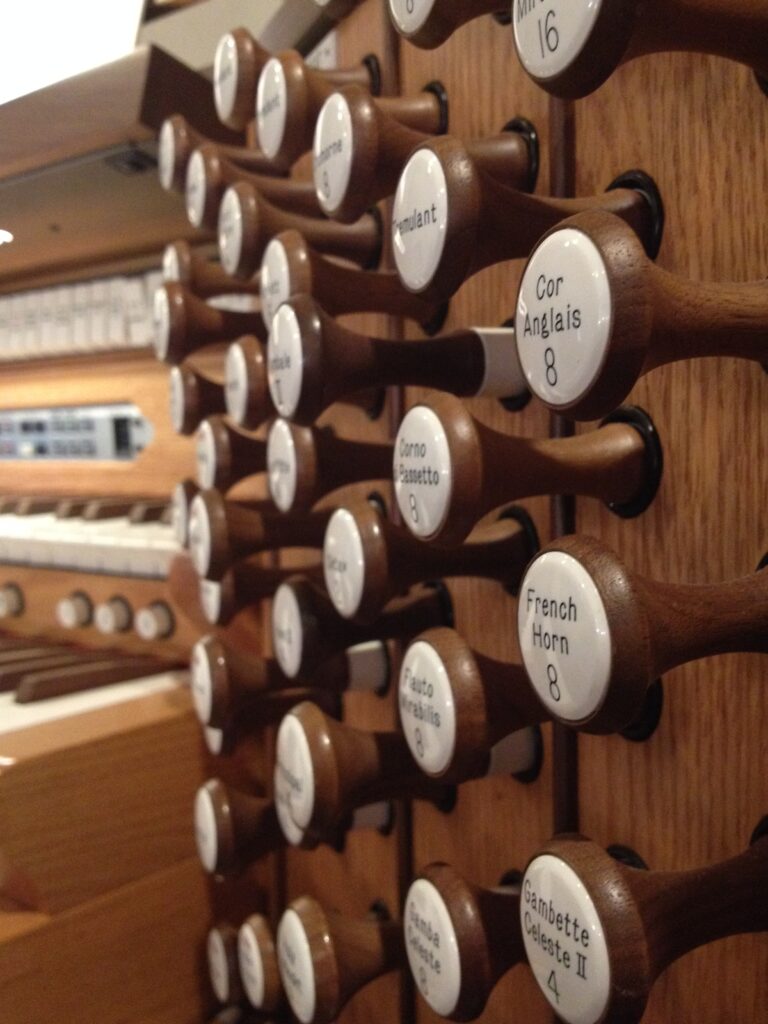Church organists play an essential role in creating a meaningful worship experience for their congregation. They are responsible for providing musical accompaniment, setting the tone, and enhancing the spiritual atmosphere of the church service. To excel in this role, the church organist must possess a unique set of specialized skills beyond just playing music.
In this article, we’ll explore 11 specialized skills for church organists. From technical musical abilities to interpersonal and organizational skills, these are the essential qualities that make a great church organist.
My background is primarily within Catholic Church services, though my earliest church work was at a non-denominational Christian church.
Azure Hills Music contains affiliate links and is a member of the Amazon Services LLC Associates Program. As an Amazon Associate, we earn from qualifying purchases at no extra cost to you when you purchase using one of these Amazon links. Read our disclaimer and privacy policy for more information.
Proficiency in Organ Playing
One of the top skills for church organists is proficiency in organ playing. Organ performance requires a high level of technical skill, including pedal technique, manual dexterity, and registration. These technical aspects allow an organist to fully utilize the instrument’s capabilities and create a rich, complex sound. A proficient church organist has mastered these techniques and can effortlessly navigate the organ’s various keyboards, pedals, and stops.
Whether you’re a seasoned keyboard player or in the early stages of adapting to the organ, taking organ lessons can unlock a new realm of musical possibilities. From understanding the intricacies of working the pedals to navigating the various stops, every aspect of organ playing contributes to creating mesmerizing melodies that resonate deep within the souls of worshippers.
A dedication to excellence is essential for church organists. The American Guild of Organists is a great resource that can help aspiring organists gain knowledge and skill with their chosen instrument.
Pedal Technique
The pedalboard is a unique organ feature that differentiates it from other keyboard instruments. It consists of pedals played with the feet to produce low bass notes. Mastering pedal technique is essential for church organists as it allows them to add depth and complexity to their playing. Using the pedals while playing with the hands requires coordination, balance, and a sense of timing.
Selecting appropriate shoes that are not too wide and have height at the heel can make playing the pedals much easier. Investing time in pedal exercises can build proficiency at the pedalboard.
Read our post about Organmaster Shoes
Sight Reading
Church organists often need to quickly adapt to new music, making strong sight-reading skills essential. Hymns, choral accompaniments, and other pieces may be added or changed at the last minute, requiring an organist to read and play the music on the spot. Excellent sight-reading skills enable a church organist to confidently handle any musical changes or additions, ensuring a smooth and seamless worship experience.
On most Sundays, I arrive at the organ loft thirty minutes before the church service and often am presented with the entire musical selection for the first time. Working your way up to the point where you can sit down with most church music and play it with near perfection the first time through will set you apart from other musicians and let you focus more on interpretation versus stressing over the mechanics of musical pieces.
You’ll be asked to play individual choral parts at choir rehearsals to help the singers. This is another opportunity to utilize sight-reading skills.
Knowledge of Liturgy
A church organist is not just a musician but also an integral part of the worship service. Understanding liturgical traditions and practices is essential for a successful church organist.
They must be familiar with parts of the liturgy, liturgical seasons, rubrics that apply to music selections and other musical elements commonly used in religious services. This knowledge allows the organist to select appropriate music that complements the sermon or liturgical theme, creating a cohesive and appropriate worship experience.
Repertoire Selection
One of the most critical skills for church organists is repertoire selection. With an extensive knowledge of sacred music, the organist can choose pieces that suit the occasion, liturgical season, and congregation. This skill requires musical expertise and a deep understanding of the church community and its diverse needs.
It is still common for prelude music to fill the church before the beginning of liturgy. This time at the organ bench can typically afford the organist approximately 10 minutes to play music before the service begins. Having a sense of the church aesthetic can guide repertoire selection. Even playing at Catholic churches, I may play at a traditional Latin mass with a modest organ, where my Prelude selections will emphasize Baroque and chant-based melodies. The same Sunday, I might play at a more modern Catholic church setting with a robust three-manual 80-stop organ where I’ll select a vastly different repertoire for my preludes.
While it’s common for a music director to select hymns and for the church service, the organist typically has responsibility for selecting, and at times improvising, during preludes, offertory, pre and post communion, and postludes.
My repertoire numbers in the hundreds of compositions from which I pull for church services throughout the year. As the Catholic Church’s liturgical cycle spans three years, I use this calendar to program music so that most works will repeat themselves on a three-year cycle. That keeps the music interesting for the congregation as well as for myself.
Collaboration
Collaboration is vital for church organists as they often work closely with other musicians, choirs, and clergy. They must be able to communicate effectively, listen attentively, and adapt to different styles of music and leadership. Collaboration also involves being open to feedback and incorporating it into their playing, ultimately creating a harmonious atmosphere during worship.
Musical Interpretation
While technical abilities are essential, musical interpretation is the heart and soul of a church organist’s role. They must bring emotion and expression to the music, conveying the spiritual message and enhancing the worship experience through their playing. Musical interpretation requires sensitivity, creativity, and an understanding of the underlying spiritual context of each piece.
Leadership from the Keyboard
Leadership is of utmost importance for church organists as they play the pre-eminent instrument for worship. With their skillful articulation at the keyboard, organists lead the way in congregational singing, adapting to the unique acoustics of the worship space. Perfecting this skill is crucial for creating an authentic and meaningful music-making experience. A church organist’s leadership ensures that the beauty and power of the organ are harnessed to enhance the worship experience for all.
Ability to Color the Sound
Registration is a crucial skill for church organists; it goes far beyond merely playing the notes. Like the diverse colors of a painter’s palette, even the smallest organ possesses a wide range of tones and timbres waiting to be explored.
Neglecting the creative potential of stops is a common pitfall for many organists. Are you playing hymns from start to finish without ever changing the stops? Are responsorial psalms stuck with the same registration throughout?
Like a skilled artist, a skilled organist knows how to paint with stops, bringing vibrant hues to each verse of a hymn and breathing life into choral anthems, inspiring both singers and listeners.
Mastering registration is a journey that requires time and methodical preparation, but the rewards are immense. Organists who exercise creativity over the stops enhance a thrilling and colorful worship service.
Transposition
Church organists often need to transpose music on the spot to accommodate different vocal ranges or instruments. This requires quick thinking, knowledge of music theory, and a strong ear for pitch. Transposition skills are especially crucial when accompanying a soloist or choir, allowing the organist to adjust the accompaniment to suit their needs.
Ability to Improvise
Improvisation skills are an essential aspect of church organ playing. Whether adding a flourish to a hymn or improvising an accompaniment for a soloist, the ability to improvise adds depth and spontaneity to the music. Improvisation allows an organist to fill in gaps during transitions or cover mistakes seamlessly, keeping the worship service flowing smoothly. They may be asked to accompany spontaneous prayers or meditations during the service.
Registration plays a vital role in the realm of church organ playing. As a church organist, having a thorough understanding of registration allows you to enhance the expression and color of the music, creating a transformative experience for both the performers and the congregation. Proper registration choices can bring out the majestic power of a hymn, the delicate beauty of a choral piece, or the ethereal atmosphere of sacred music.
By skillfully selecting and manipulating the various stops and combinations available on the organ, you can effectively convey the emotions and messages inherent in the liturgy, creating a deeper connection between the music and the worshippers. So, embrace the art of registration and let the organ soar with its glorious voices to elevate the spiritual journey of all present.
Communication with Clergy and Congregation
Finally, communication skills are crucial for church organists. They must be able to communicate effectively with clergy and other musicians to ensure a successful worship service. Additionally, as they often sit facing the congregation, they must have solid non-verbal communication skills to convey emotion and connection through their playing. A great church organist knows how to use their music to communicate with the congregation and create a meaningful worship experience.
In addition to these technical musical skills, communication skills are also necessary for church organists. As mentioned before, they often work closely with other musicians, clergy, and the congregation. Effective communication is crucial in ensuring everyone is on the same page regarding music selections, cues, and overall coordination during the service.
Communication plays a crucial role in the role of an organist. Whether meeting grieving families during a time of loss or assisting couples in planning their wedding day, the organist’s ability to effectively communicate can make or break the experience for everyone involved. It is essential to recognize that individuals approaching these life events have a unique perspective, different from our own.
Our responsibility as organists is to guide and shape their understanding of the liturgy in accordance with church documents, offering suitable alternatives when faced with non-liturgical requests. Being pastoral may not always be easy, but it is vital to remember that we represent the parish and the broader church community. The experiences people have with us, particularly those in highly emotional or challenging circumstances, reflect a great deal about our parish and the Christian community. Effective communication is key to fostering meaningful connections and creating a positive impact.
Conclusion
In conclusion, being a church organist requires much more than just musical abilities. It takes a combination of technical skills, knowledge of liturgy and repertoire, collaboration, communication, and artistic interpretation to excel in this role.
A great church organist enhances the worship experience through their playing and plays an integral part in creating a meaningful and spiritual atmosphere for the congregation. So, if you aspire to be a church organist or are looking for ways to improve your skills, focus on developing these top skills for church organists.
With dedication and practice, you can become an exceptional church organist who brings joy and inspiration to worship services. Keep playing and keep growing in your musical journey!



